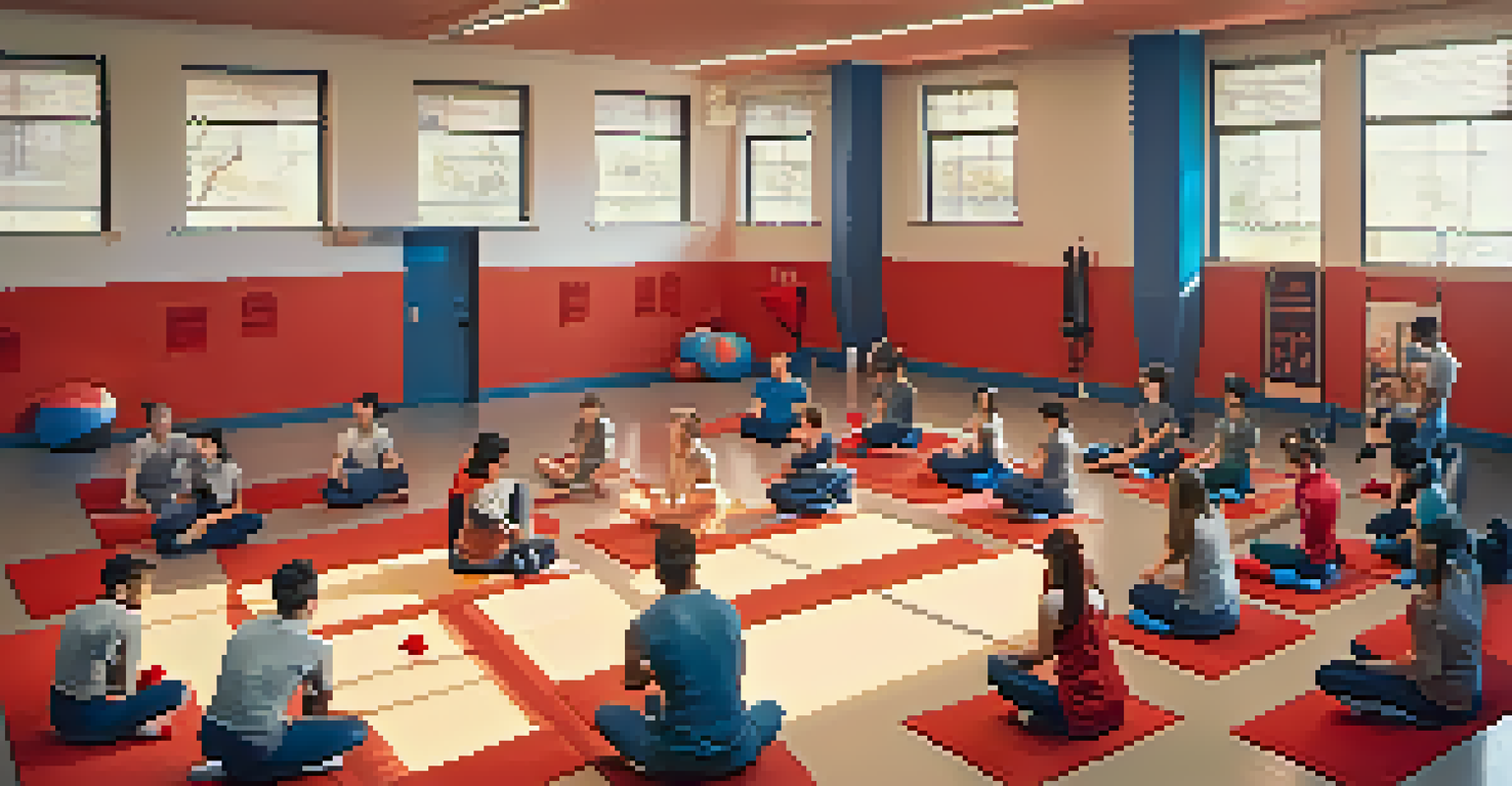Mind-Body Connection: Mental Fitness in Self Defense

Understanding the Mind-Body Connection in Self Defense
The mind-body connection is a powerful concept that emphasizes how our mental state can influence our physical actions. In self-defense, this connection is crucial, as a calm and focused mind can enhance our ability to react effectively to threats. Essentially, being mentally fit allows us to maintain clarity during stressful situations.
The mind is everything. What you think you become.
When faced with danger, our bodies often respond with a fight-or-flight reaction. However, if our minds are trained to stay calm, we can make better decisions and respond more effectively. This means that mental preparation is just as important as physical training in self-defense.
Practicing mindfulness techniques can significantly improve this connection. By focusing on our breathing and staying present, we can cultivate the mental resilience needed for self-defense scenarios. This not only enhances our physical responses but also boosts our confidence.
The Role of Mental Fitness in Self Defense Scenarios
Mental fitness refers to our ability to cope with stress, think clearly, and make sound decisions under pressure. In self-defense situations, the right mental state can mean the difference between success and failure. When our minds are sharp, we can assess situations quickly and act accordingly.

For instance, consider a self-defense class where students are taught to visualize potential threats. This mental rehearsal prepares them for real-life scenarios, creating a clearer pathway for action. It’s like practicing for a big performance; the more you rehearse, the more confident you become.
Mind-Body Connection Enhances Defense
A calm and focused mind improves physical responses in self-defense situations.
Moreover, mental fitness training can include techniques such as visualization, meditation, and positive affirmations. These practices help build mental resilience, enabling individuals to respond to unexpected situations with greater ease and confidence.
How Stress Impacts Our Body and Reactions
Stress can have a profound effect on both our mind and body, often leading to panic or indecision in high-pressure situations. When we experience stress, our bodies release hormones like adrenaline, which can either enhance performance or hinder it. Understanding this response is vital in self-defense training.
In the midst of movement and chaos, keep stillness inside of you.
For example, imagine someone facing an aggressor. If they are overwhelmed by fear, their body might freeze, making them unable to react. Conversely, if they can manage their stress through mental fitness techniques, they are more likely to respond effectively.
That’s why self-defense training often includes stress inoculation exercises. These scenarios mimic real-life threats, allowing individuals to practice maintaining control under pressure. This training builds confidence and familiarity, making it easier to handle real situations.
Techniques to Strengthen the Mind-Body Connection
Various techniques can strengthen the mind-body connection, enhancing overall self-defense capabilities. One effective method is mindfulness meditation, which encourages individuals to focus on their breath and sensations. This practice helps cultivate a sense of calm and awareness.
Another powerful technique is visualization, where individuals mentally rehearse their responses to potential threats. By creating a vivid mental image of how they would react, they prepare their minds to respond more effectively in real situations. It’s akin to watching a movie where you are the hero, ready to take action.
Mental Fitness is Crucial for Success
Training the mind through visualization and mindfulness prepares individuals to react effectively under pressure.
Additionally, incorporating physical exercise into your routine can boost both mental and physical fitness. Activities like yoga, martial arts, or even running can help synchronize the mind and body, making you more responsive and aware of your surroundings.
Building Confidence through Mental Preparation
Confidence is a crucial element in self-defense, and it often stems from mental preparation. When individuals feel mentally prepared, they are more likely to trust their instincts and capabilities during a confrontation. This sense of readiness can significantly enhance their performance.
Consider someone who has practiced self-defense techniques repeatedly. They not only know the moves but have also visualized themselves executing them successfully. This repeated mental rehearsal solidifies their confidence, making them less likely to second-guess themselves in a real-life situation.
Moreover, positive self-talk can play a vital role in building confidence. Encouraging oneself with affirmations can combat negative thoughts that often accompany fear, reinforcing a strong mindset that is essential for effective self-defense.
The Interplay of Emotion and Physical Response
Emotions can significantly influence our physical responses in self-defense scenarios. Fear, anxiety, and anger can either hinder or fuel our reactions, making it essential to manage these emotions effectively. Understanding this interplay is key to mastering self-defense.
For instance, someone feeling overwhelmed might struggle to react appropriately to a threatening situation. However, if they learn to channel their emotions into focus and determination, they can turn that anxiety into a powerful response. It’s like turning a negative force into a positive one.
Emotions Influence Physical Reactions
Managing emotions like fear and anxiety can enhance decision-making and response in self-defense scenarios.
Techniques like deep breathing can help regulate emotions and enhance physical responses. By calming the mind, individuals can clear their thoughts and respond strategically, rather than impulsively. This balanced approach creates a more effective self-defense strategy.
Integrating Mindfulness into Self Defense Training
Integrating mindfulness into self-defense training can lead to more effective outcomes. Mindfulness encourages practitioners to be present and aware of their surroundings, which is crucial during a confrontation. This heightened awareness can help identify potential threats early.
Practicing mindfulness also allows individuals to observe their thoughts and feelings without judgment. This practice can reduce anxiety and increase composure, enabling quicker decision-making in stressful situations. It’s like being a spectator in your own life, watching the events unfold with clarity.

Incorporating mindfulness exercises into training sessions can enhance both physical and mental preparedness. By regularly practicing these techniques, individuals can develop a more robust mind-body connection that is essential for effective self-defense.